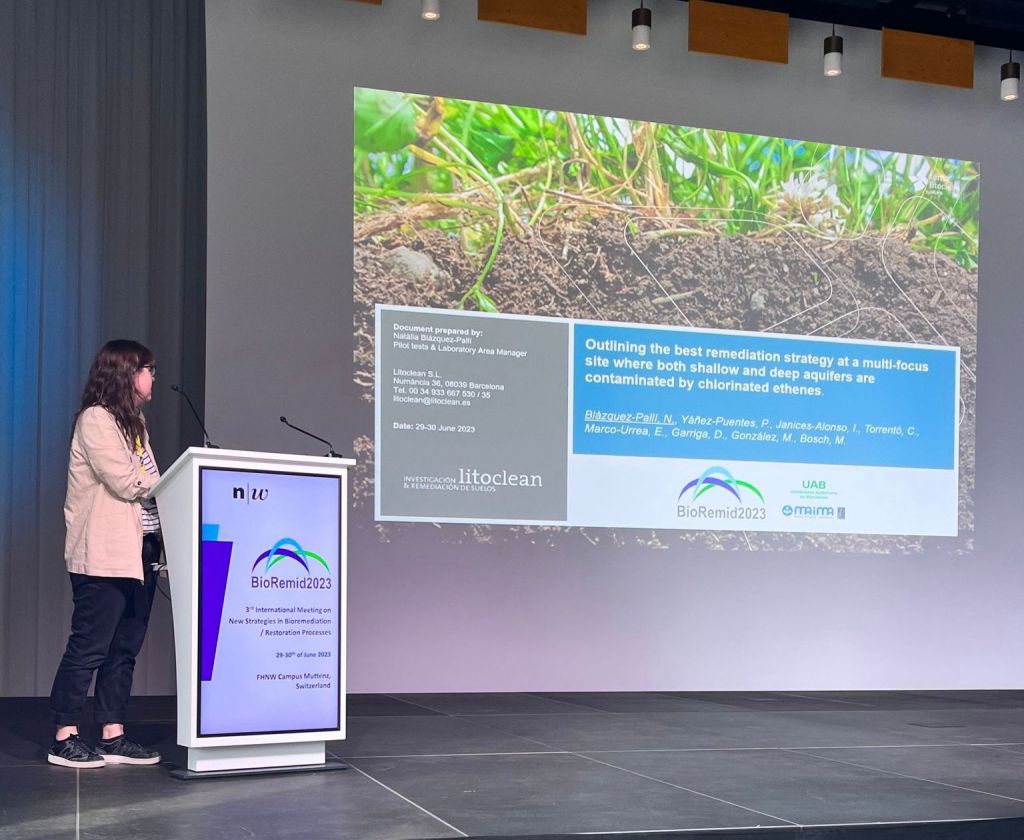Litoclean present in various international bioremediation events
Natàlia Blàzquez Pallí presents an speech at Bioremid2023, and also present in the workshop of various projects funded by EU.

From Wednesday 28th to Friday 30th of June, the campus of the School of Life Sciences of the University of Applied Sciences and Arts Northwestern Switzerland (FHNW) in Muttenz (Switzerland) has brought together experts in bioremediation and restoration processes of soils and groundwater thanks to the organization of two international events on this innovative technology. Litoclean, as an expert on bioremediation strategies, has been present in both.
The first event, held on June 28, consisted of a workshop that brought together the 7 bioremediation projects funded by the European Union (MIBIREM, BIOSYSMO, SYMBIOREM, NYMPHE, ELECTRA, EiCLAR and GREENER). Both from the finished projects and those recently started, which delve into microbiome science, microbiology and biotechnology, and cover different strategies such as electrobioremediation, phytoremediation and bioaugmentation, it is expected that the results push these technologies forward and improve their application in real cases of soil and groundwater contamination.
Then, on June 29 and 30, the third edition of the International Meeting on New Strategies in Bioremediation and Restoration Processes (Bioremid 2023) was held. The objective of this congress is to connect the academic and the business sector, in order to share the latest advances in the fight against environmental degradation, such as biological risk identification; monitoring techniques; remediation strategies for sites contaminated by priority substances (metals and organic compounds) and emerging contaminants (plastics, microplastics, pharmaceutical compounds); new strategies for the management of the integral water cycle, and the management of biological waste.
That same Thursday, Natàlia Blázquez Pallí, LITOCLEAN's Pilot Test and Laboratory Area Manager, gave an oral presentation on the study case of a site contaminated by chlorinated ethenes in which laboratory treatability studies and field pilot tests have been carried out to verify the feasibility and efficiency of bioremediation treatments in order to design a potential remediation strategy for the study site. For this purpose, molecular techniques have been used to identify, quantify and characterize the bacteria responsible for the biodegradation of chlorinated contaminants, as well as the analysis of stable isotopes, which can confirm the occurrence and extent/efficiency of biodegradation processes. This work has been carried out in collaboration with the research groups BioremUAB, from the Autonomous University of Barcelona, and MAiMA, from the University of Barcelona.
The results presented at Bioremid 2023 are part of a bigger project in which the rest of the LITOCLEAN team (composed of Pedro Yáñez, Irene Janices, Arnau Borrell, David Garriga, Marta González and Marçal Bosch) has been working for more than a year and a half, and which has also included the investigation, evaluation and comprehension of the issues caused by the presence of organochloride compounds in a complex aquifer, and its hydrogeological characterization (including an hydrogeological model).
